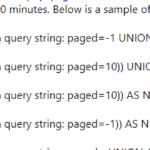 In recent months, the software that I use to protect this site from malicious attacks, has seen a marked increase in the number of attempts that have been made to ‘get at it’ – to use a term I am sure is often cited in the computer tech world.
In recent months, the software that I use to protect this site from malicious attacks, has seen a marked increase in the number of attempts that have been made to ‘get at it’ – to use a term I am sure is often cited in the computer tech world.
Why anyone should want to get at my humble little site, is a mystery to me.
But it is concerning.
Our resident expert in such things, assures me that there is most likely nothing to worry about. as it’s probably just bots doing their thang.
I have taken relevant precautions: changed the default login name and password to something which would be far more difficult to crack and stuff like that, but it still concerns me, as the attacks seem to be on the increase. Was it something I said, I wonder?
And then yesterday, I got the report shown in the pic above. 342 in ten minutes! This is getting silly.
Dave, as you can see, it’s over your way, could you have a word?
I have had a word with the feral cats of the village and even as I type they are combing the land to find the culprits. They will send you their bill. Their preferred currency is tuna or herring.
Merci, mon ami.
They are trying to find out who is using all of their electricity that the French are sending over.
At least that was 342 failed attempts.
We still use froggy leccy? Even after Brexit?
Yes, well, that’s looking on the bright side, I s’pose, Alan. 🙂
Concatenations are definitely bot activities – looking for an unpatched vulnerability in the database., but that’s an interesting use of UNION ALL which is somewhat contradicted by the specific address. If I had the time I’d ask you to send the whole string to me so I could unpick it to see what the precise point of the SQL injection is. But time. It’s never around when you want some. Also those IPs are probably spoofed. True root is probably either Russia or China.
Russia? The Russians are after me? Arrgh!
That’s all I need: Polonium in my tea.
Google told me that 15 of my passwords for different websites are already exposed.. Possibly because all of them are same… Its good that they were of travel, shopping etc… And the one which is not exposed is common for 170 sites.. Now how can one create 170 different passwords and remember them. Any suggestions..